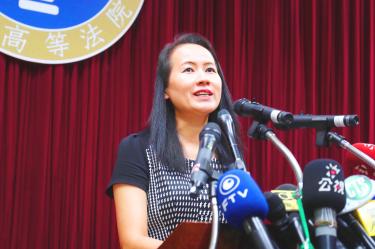The Taiwan High Court yesterday acquitted former president Ma Ying-jeou (馬英九) of charges that he leaked classified information and breached telecommunications security law stemming from wiretaps conducted in 2013 of leading political figures in the Legislative Yuan.
The Taipei District Court found Ma not guilty in the first ruling in 2017. Last year, the High Court found Ma guilty and handed down a four-month prison sentence. In January, the Supreme Court ordered a retrial and returned the case to the High Court, resulting in yesterday’s ruling, which is final.
Prosecutors focused on Ma’s interactions with then-prosecutor-general Huang Shih-ming (黃世銘), who led the now-defunct Special Investigation Division, and his acquiring of wiretap transcripts, which they said were contraventions of the Communication Security and Surveillance Act (通訊保障及監察法), the Personal Information Protection Act (個人資料保護法) and the Criminal Code.
The High Court yesterday said that it was Huang who requested a meeting with Ma and gave him the wiretap transcripts, adding that Ma did not use his authority as president to engage in illegal action.
The presiding judge ruled that Ma did not break the law and was not an accomplice to illegal actions by Huang, the only person to have been found guilty in the case, for which he received a 15-month sentence that can be commuted to a fine.
“The evidence prosecutors presented was insufficient to convict the defendant of breaking the law as charged. Therefore, the judges adhered to the principle of innocent until proven guilty,” High Court spokeswoman Lien Yu-chun (連育群) said.
Activities relating to the case began in August 2013, when Huang directed the division to wiretap Democratic Progressive Party caucus whip Ker Chien-ming (柯建銘), then-legislative speaker Wang Jin-pyng (王金平) of the Chinese Nationalist Party (KMT) and other lawmakers and political figures, citing allegations of improper lobbying by Ker in a breach of trust case.
Investigators found that Ma had talked about the matter with Huang, who later met with Ma three times to provide wiretap transcripts, which Ma then discussed with then-premier Jiang Yi-huah (江宜樺) and then-Presidential Office deputy secretary-general Lo Chih-chiang (羅智強).
The secret investigation and wiretapping sparked a political storm that rocked the KMT and was later dubbed the “September strife.”
Ma’s office yesterday issued a statement saying that he was gratified by the acquittal, because the result was not just about Ma’s innocence on all counts, “but it also helps establish the administrative authority of a sitting president under the provisions of the Constitution.”
“It will enable the nation’s leader to govern with presidential authority and abide by the law as enshrined in the Constitution,” the statement said.
However, Ma is not completely out of legal jeopardy, as he was last year indicted by Taipei prosecutors over an alleged breach of trust and financial irregularities in the sale of KMT property to three media outlets in 2005 and 2006.
That trial is still pending at the Taipei District Court, but Ma has been summoned for questioning and cross-examination.
Prosecutors have said that Ma forced through the sales at below market prices to benefit certain individuals in breach of the Securities and Exchange Act (證券交易法), resulting in financial losses of about NT$7.2 billion (US$231.7 million at the current exchange rate).
Source: Taipei Times - 2019/07/13





















